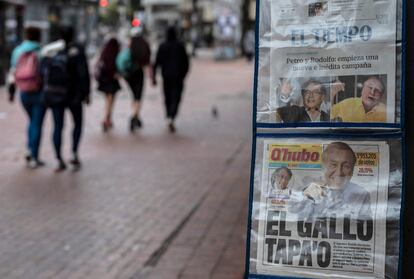Gustavo Petro’s new strategy in Colombia: Win over moderate voters
The left-wing candidate for Colombia’s presidency wants people to see him as an advocate for prudent change unlike his opponent, the anti-establishment populist, Rodolfo Hernández

Gustavo Petro owned the word “change” during the first round of Colombia’s presidential elections. His critics claimed that a vote for Petro was a leap into the unknown since Colombia has never had a progressive government. However, the results of the first-round vote on May 29 have transformed the landscape for the runoff. Petro’s populist opponent, Rodolfo Hernández, is a 77-year-old businessman who heard the good news of his second-place finish in his kitchen. Compared to Hernández, Petro’s strategists say that their candidate represents “moderate and prudent” change – a politician never knows what awaits around the corner.
The leftist candidate garnered 8.5 million votes, 40% of the first-round total. Petro estimates that he will need at least another 1.5 million votes to win the runoff. He will try to lure away the impulsive, last-minute voters that supported Hernández in the first round, mobilize those who didn’t cast a vote and attract the centrist voters who have regarded him with a certain disdain in the past. In the first round, the intellectual elites supported Sergio Fajardo, the moderate candidate, while the business elites were aligned with Federico “Fico” Gutiérrez, the right-wing candidate. But both of these politicians failed to get enough votes and were knocked out of the race. Colombia’s well-off minorities are no longer able to install their preferred candidate as president, as they did in the past. But they can still swing a race, and Petro wants them in his camp. He is convinced that the populist Hernández, who once declared his admiration for Adolf Hitler (although he later recanted), represents a real danger to the country.
It remains to be seen how well Petro can play this new role. He has always been the outsider, the fringe politician. He gained greater political relevancy around 2000, when Álvaro Uribe swept to power in a wave of conservatism that would last for the next 20 years. Petro and his political brethren formed the opposition and were able to win some mayorships as Petro did in Bogotá, but they could hardly aspire to the presidency. But now, only Petro and Hernández are still standing after all the right-wing candidates failed to survive the first round. Hernández represents a contradictory political option because he is a millionaire builder who claims to be anti-establishment. Political analysts say that Petro, the former M-19 guerrilla leader, now may be the most conservative candidate still in the race, since he is a career politician who has spent half his life in Congress.
Stalled at 40%
Petro believed he could win the election in the first round, but that dream died last week when he failed to win more than 40% of the vote. All he needed was an additional 10% or so to win outright. The combined vote total for Gutiérrez and Hernández exceeded Petro’s total, which many feel leaves him at a disadvantage. But armed with the latest data, Petro’s advisors remain optimistic.
He garnered the highest absolute number of votes for any first round in Colombian history, 3.6 million more than what he won in 2018′s first round, and almost 500,000 more than what he garnered in the runoff of the same election. No candidate with similar first round results has ever been defeated in a runoff But that was when traditional political parties still counted, and everything was more predictable. Meanwhile, Hernández has used TikTok for much of his campaign.

Petro’s campaign strategy is now focused on the affluent political minorities. In the first round, Sergio Fajardo only won 4.2% of the vote. But combined with the votes won by Luis Pérez, another little-known candidate, they add up to 1.2 million. To attract these voters, Petro is seeking prominent endorsements from people like Alejandro Gaviria, a former university rector and respected intellectual who failed to gain traction in his party’s primaries, or José Antonio Ocampo, a prestigious economist who could manage the nation’s economic affairs in a Petro presidency. Sergio Fajardo himself could join the Petro administration, as Fajardo holds him in high esteem. But it seems that the admiration is not mutual, and Fajardo will likely support Hernández, who previously considered aligning with. But Perhaps Fajardo will refuse to endorse any candidate, as he did four years ago, which paved the way for Iván Duque’s eventual victory. Back then he said he would go whale watching after the first round, an expression that has become synonymous with not taking sides.
To surpass the critical eight-million-vote threshold, Petro will have to mobilize an apathetic electorate. Last Sunday, only 54% of registered voters went to the polls. Much of Colombia is disenchanted with the country’s economic situation and with its state of democracy. This frustration erupted into protests that paralyzed parts of the country for months last year. Ivan Dúques’ handpicked successor, Fico Gutiérrez, was doomed to failure from the beginning, not because he was a poor candidate, but because he represented a political faction that had lost credibility.
The traditional candidates have been defeated, and the two who remain standing both claim to represent change. But what kind of change? Petro has managed to channel some of the frustration of last year’s protestors, but not all of it. Otherwise, he would have won the presidency in the first round. His challenge now is to broaden his voter base among centrists, and even liberals. As election results rolled in last Sunday evening, Petro expressed the choice for Colombian voters in stark terms: “Sometimes what looks like change isn’t change at all – it’s suicide. What do we want– change or suicide?”
Tu suscripción se está usando en otro dispositivo
¿Quieres añadir otro usuario a tu suscripción?
Si continúas leyendo en este dispositivo, no se podrá leer en el otro.
FlechaTu suscripción se está usando en otro dispositivo y solo puedes acceder a EL PAÍS desde un dispositivo a la vez.
Si quieres compartir tu cuenta, cambia tu suscripción a la modalidad Premium, así podrás añadir otro usuario. Cada uno accederá con su propia cuenta de email, lo que os permitirá personalizar vuestra experiencia en EL PAÍS.
¿Tienes una suscripción de empresa? Accede aquí para contratar más cuentas.
En el caso de no saber quién está usando tu cuenta, te recomendamos cambiar tu contraseña aquí.
Si decides continuar compartiendo tu cuenta, este mensaje se mostrará en tu dispositivo y en el de la otra persona que está usando tu cuenta de forma indefinida, afectando a tu experiencia de lectura. Puedes consultar aquí los términos y condiciones de la suscripción digital.








































